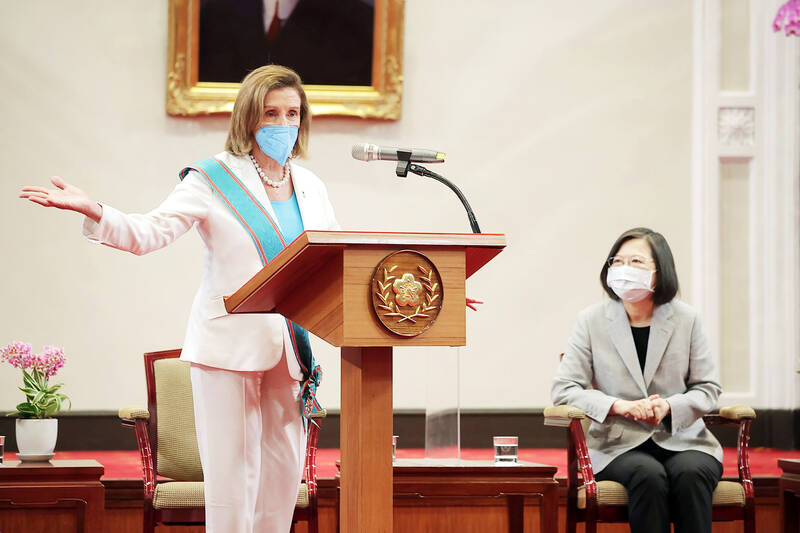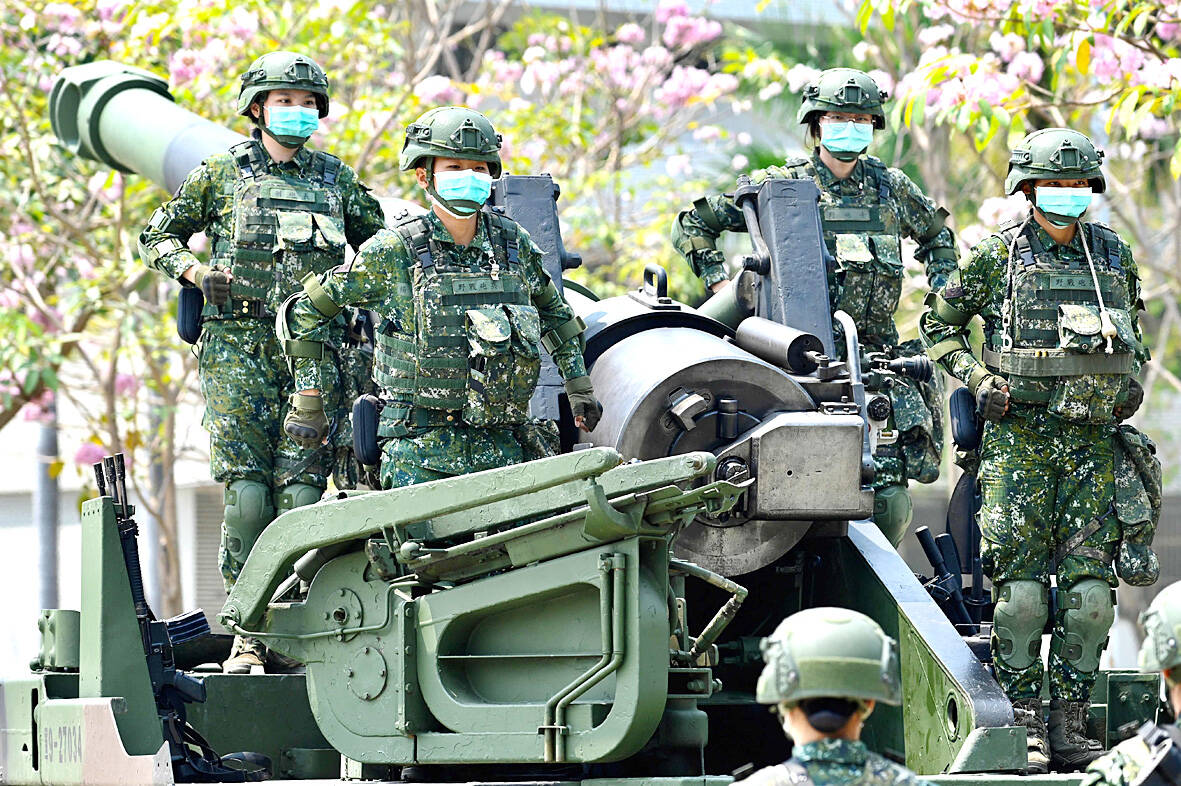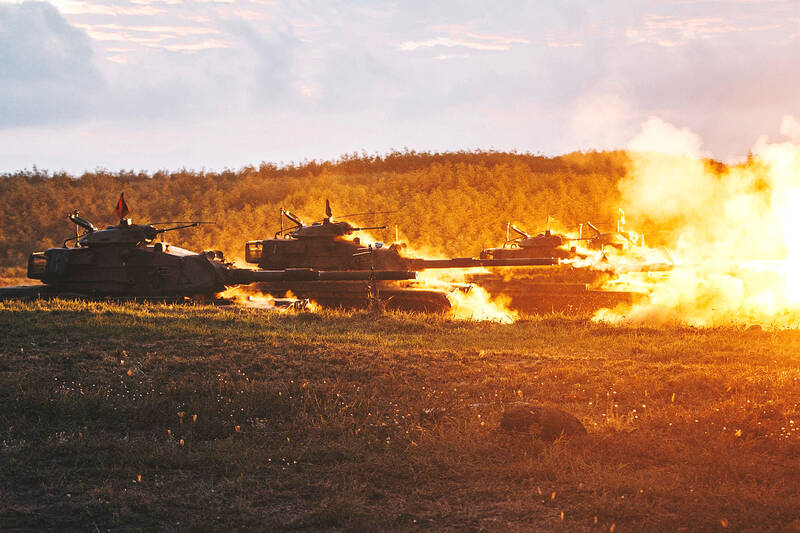Word has it that the US Congress’ bold move last week on Taiwan, the Taiwan Policy Act (TPA), is going to be an earthquake for Taiwan policy. The bill calls for arms worth US$4.5 billion, along with a US$2 billion loan program for weapons purchases, permission to change the name of the US representative office, making the head of the US office here equal to an ambassador requiring confirmation by the Senate and designation of Taiwan a major non-NATO ally.
It alters the wording of the 1979 Taiwan Relations Act (TRA), which encourages the US to provide arms of a defensive nature for Taiwan, to arms to “deny and deter acts of aggression.” It also specifies sanctions for China if it attacks Taiwan. Finally, the bill establishes a “regional contingency stockpile” to ensure that Taiwan has the defensive weapons, protective gear and medical supplies on-island in case of Chinese attack.
BIPARTISAN SUPPORT

Photo: AP
Alas, as we moved toward the end of last week, the administration of US President Joe Biden was actively attempting to get Congress to water down the symbolic language of the bill. In Zhongnanhai they must be doubling over with laughter watching the administration gather up its skirts and rush into Congress to get the symbolic wordings changed, all because the Chinese made some noise.
A victory at no cost to Beijing! Chinese leaders could care less what verbiage the US uses, since it is all going to be drowned in fire at some point anyway. Getting upset about it is simply a rhetorical posture Beijing uses to shape the US debates and fire up its domestic audience.
As this bill was heading out of the Senate Foreign Relations Committee, both Republican and Democratic senators spoke strongly in favor of it. All news reports indicate that it has strong bipartisan support.

Photo: AFP
The widespread support for the bill in Congress shows how Taiwan has benefited from years of struggle by advocates in Washington to make sure that it does not become a partisan issue, with one party reflexively for and one party reflexively against, and the nation’s defense needs stalled in the US Congress as a result.
The bill has been in the works for over a year. China’s pressure on Taiwan has drawn a strong response from the US Congress. A congressional staffer posting on Twitter stated: “This bill IS, however, due to PRC provocation/its military & econ aggression against Taiwan over the past few years.”
The response to the bill also showed how the commentary on “provoking China” has reached peak weird — it is possible for commentators to argue that the symbolic aspects of the bill may convince China that the US has changed its policy on Taiwan, but US$4.5 billion in weapons plus a loan facility for weapons purchases worth another US$2 billion is just fine. Say what?

Photo: AFP
This strange dichotomy between tangible and intangible parts of an overarching policy made by commentators is not visible in China’s expansionist aggression toward Taiwan and the lands beyond. Beijing treats the tangible and intangible parts of its policies as seamless, lawfare and disinformation complementing the deployment of military assets and boosting of production at shipyards. We should do no less.
It is borderline silly to worry about renaming the US office in Taiwan when China has a sophisticated influence program aimed at all the Western democracies, and has in custody citizens of other democracies for committing the “crime” of speaking and writing about China. When it is imprisoning and starving Uighurs. When its propaganda constructions of history are regularly shoved into newspapers and academic writing as if they were reality. When its claims on others’ territories expand, and its markets remain closed to leading Western firms. When it regularly threatens to kill the people of Taiwan, including the 70,000 or so US citizens here.
How has deferring to China’s sensitive feelings ever changed any of this behavior?
How many times am I going to have to write that paragraph followed by that question?
A Financial Times piece on the bill (“US’s Taiwan security bill spurs debate on level of support for Taipei”, Demetri Sevastopulo, Sept. 13) quoted academic Bonnie Glaser as saying: “If the bill passes in its current form, we’re really in for a major crisis.”
Several other prominent commentators made similar arguments.
MAJOR CRISIS?
I got news for the people thinking that: we’re already heading for a major crisis. Failing to pass bills like this will only provoke a Chinese invasion, in the same way that failing to bring Ukraine into NATO lead inexorably to Russian President Vladimir Putin’s invasion. Indeed, the noises that Putin made about NATO had exactly the same function as the noises China makes about bills like this: to keep them from happening, thus lowering the cost of military action.
The bill’s supporters in Washington made the same point, arguing that Ukraine’s experience showed that the weapons had to be there before the conflict began. The Ukraine war has convinced many that the Chinese threat to Taiwan is real and that they should act. Thank you, Vladimir Vladimirovich, for driving a truck through years of patient work by China to blunt the West’s response to the Taiwan scenario.
Policymakers should be reminded: whatever costs the Chinese response has for Washington or Taiwan, they will still be less than the cost of a regional war. If Europe and the US had permitted Ukraine to enter NATO, they would not be spending billions in its defense, there would be no threat of famine in poorer nations, the world would not be teetering on the brink of global recession and tens of thousands of Ukrainians would still be alive.
We got the same warnings of disaster about the Pelosi visit. The Chinese took the steps they were planning to take sooner or later, and we got this bill and a world awakened to the problems we face.
Reading the comments on what Beijing might do, I was reminded of General Ulysses Grant’s comments to one of his subordinates at the Battle of the Wilderness in the US Civil War: “Oh, I am heartily tired of hearing about what Lee is going to do. Some of you always seem to think he is suddenly going to turn a double somersault, and land in our rear and on both of our flanks at the same time. Go back to your command, and try to think what we are going to do ourselves, instead of what Lee is going to do.”
Last week China’s leader Xi Jinping (習近平) and Putin met in Samarkand amidst military exercises in the northern Pacific celebrating their ‘no limits’ partnership, presumably even closer than lips and teeth.
Last week too Chinese vessels at Philippines’ Scarborough Shoal (Huangyan Island, 黃岩島) drove off another attempt at resupplying the sailors of the rusting Philippines’ ship.
These developments show that the TPA cannot stand alone. The US also needs Congress to move forward with a major expansion of US shipbuilding capacity and a shipbuilding program resembling the Two-Ocean Navy Act of 1940. Weapons for Taiwan are great, but they have to be supported and augmented by US capabilities.
Time to fire up those production lines, Washington. Think the war in Ukraine is consuming munitions? Wait until you all see what a war with Beijing will demand.
Notes from Central Taiwan is a column written by long-term resident Michael Turton, who provides incisive commentary informed by three decades of living in and writing about his adoptive country. The views expressed here are his own.

President William Lai (賴清德) yesterday delivered an address marking the first anniversary of his presidency. In the speech, Lai affirmed Taiwan’s global role in technology, trade and security. He announced economic and national security initiatives, and emphasized democratic values and cross-party cooperation. The following is the full text of his speech: Yesterday, outside of Beida Elementary School in New Taipei City’s Sanxia District (三峽), there was a major traffic accident that, sadly, claimed several lives and resulted in multiple injuries. The Executive Yuan immediately formed a task force, and last night I personally visited the victims in hospital. Central government agencies and the

Australia’s ABC last week published a piece on the recall campaign. The article emphasized the divisions in Taiwanese society and blamed the recall for worsening them. It quotes a supporter of the Taiwan People’s Party (TPP) as saying “I’m 43 years old, born and raised here, and I’ve never seen the country this divided in my entire life.” Apparently, as an adult, she slept through the post-election violence in 2000 and 2004 by the Chinese Nationalist Party (KMT), the veiled coup threats by the military when Chen Shui-bian (陳水扁) became president, the 2006 Red Shirt protests against him ginned up by

As with most of northern Thailand’s Chinese Nationalist Party (KMT) settlements, the village of Arunothai was only given a Thai name once the Thai government began in the 1970s to assert control over the border region and initiate a decades-long process of political integration. The village’s original name, bestowed by its Yunnanese founders when they first settled the valley in the late 1960s, was a Chinese name, Dagudi (大谷地), which literally translates as “a place for threshing rice.” At that time, these village founders did not know how permanent their settlement would be. Most of Arunothai’s first generation were soldiers

Among Thailand’s Chinese Nationalist Party (KMT) villages, a certain rivalry exists between Arunothai, the largest of these villages, and Mae Salong, which is currently the most prosperous. Historically, the rivalry stems from a split in KMT military factions in the early 1960s, which divided command and opium territories after Chiang Kai-shek (蔣介石) cut off open support in 1961 due to international pressure (see part two, “The KMT opium lords of the Golden Triangle,” on May 20). But today this rivalry manifests as a different kind of split, with Arunothai leading a pro-China faction and Mae Salong staunchly aligned to Taiwan.